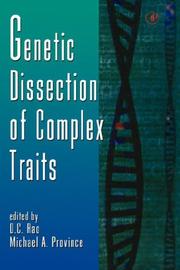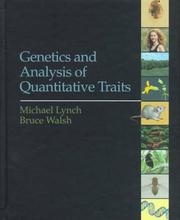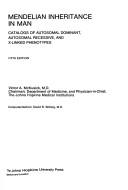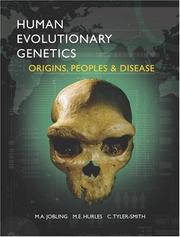| Listing 1 - 6 of 6 |
Sort by
|
Dissertation
ISBN: 9789088263293 Year: 2013 Volume: 1138 Publisher: Leuven Katholieke Universiteit Leuven
Abstract | Keywords | Export | Availability | Bookmark
 Loading...
Loading...Choose an application
- Reference Manager
- EndNote
- RefWorks (Direct export to RefWorks)
The knowledge about how phenotypic variation evolves can help us to reveal the way populations are shaped which determines whether an organism displaying certain phenotypic trait has the ability to respond to environmental changes. The main goal of this PhD thesis is to reconstruct the genetic changes underlying observed phenotypic variation during the course of evolution at different phylogenetic distances. In our work we considered both discrete and continuous phenotypic traits and approached their study by applying comparative methodologies at the genomic and/or transcriptomic levels.In the first part of the thesis we investigated the evolution of the plant pathogenic phenotype in Ascomycetes by comparing the genomes, as well as the transcriptomes of pathogenic and non-pathogenic species. This allowed us showing that most of the genes related to pathogenesis were already present in the ancestor of the Ascomycete lineages we used in our study. Species that did not develop the pathogenic phenotype seemed to have reduced their genetic complexity compared to their ancestors. At the transcriptomic level, plant pathogenesis is likely the result of various mechanisms including: expression divergence of direct orthologs between pathogens and non-pathogens, gene dosage and neofunctionalization of duplicated genes, and fast expression evolution of entire gene families. In the second part of the thesis we focusded on the evolution of phenotypic traits with a continuous variation and studied the tolerance to high ethanol phenotype in yeast. We developed a novel methodology called EXPLoRA for the analysis of data from Bulk Segregants Analysis (BSA). EXPLoRA was then used to detect regions linked to the tolerance to high ethanol on the yeast genome. We were able to capture the underlying block-like behavior of BSA data by explicitly modelling the effects of linkage disequilibrium between neighboring marker sites. Experimental validation of one of our predictions, by identifying its causative gene VPS70, confirmed the potential of our method.With the present work we also wanted to contribute to the increasing demand that exist for the proper functional annotation of bacterial genomes. Such demand comes from the massive amount of novel genomes that are nowadays released thanks to the Next Generation Sequencing technologies. Moreover, high quality functional annotations are mandatory in order to draw conclusions from comparative genomic analyses. A network-based methodology for the functional annotation of bacterial glycomes is presented in this thesis. Our analysis resulted in a comprehensive re-annotation of putative glycosyltransferases in Lactobacillus rhamnosus GG including their possible substrates and mode of action. We provide insights in putative novel mechanisms of (protein) glycosylation, including a potential promiscuous role of GTs involved in PG biosynthesis. This work established the basis for downstream comparative initiatives to study the evolution of the glycosylation potential across Lactobacillus species.
academic collection --- 575.21 --- Phenotypic variation. Phenotype --- Theses --- 575.21 Phenotypic variation. Phenotype

ISBN: 0120176424 Year: 2001 Volume: 42 Publisher: San Diego (Calif.) : Academic press,
Abstract | Keywords | Export | Availability | Bookmark
 Loading...
Loading...Choose an application
- Reference Manager
- EndNote
- RefWorks (Direct export to RefWorks)
575.116 --- 575.21 --- 575.22 --- Gene linkage. Chromosome map --- Phenotypic variation. Phenotype --- Genotypic variation. Genotype --- Genetic epidemiology --- Morton, Newton Ennis, --- 575.22 Genotypic variation. Genotype --- 575.21 Phenotypic variation. Phenotype --- 575.116 Gene linkage. Chromosome map --- Molecular epidemiology --- Morton, Newton E. --- Human gene mapping --- Congresses --- Genetic disorders --- Genotype --- Linkage (genetics) --- Lod score --- Phenotype --- Quantitative trait

ISBN: 0878934812 9780878934812 Year: 1998 Publisher: Sunderland (Mass.) : Sinauer associates,
Abstract | Keywords | Export | Availability | Bookmark
 Loading...
Loading...Choose an application
- Reference Manager
- EndNote
- RefWorks (Direct export to RefWorks)
QH 452.7 Quantitative Genetics --- Quantitative genetics --- Quantitative genetics. --- Génétique quantitative --- Expression des gènes --- gene expression --- Variation génétique --- genetic variation --- Germplasm --- Carte génétique --- genetic maps --- Gène dominant --- dominant genes --- Génotype --- genotypes --- Polymorphisme génétique --- Genetic polymorphism --- Paramètre génétique --- genetic parameters --- Évaluation --- evaluation --- 575.21 --- #WDIR:wbse --- #ABIB:CHGS --- 575.2 --- Genetica (erfelijkheidsleer) --- Quantitative inheritance --- Phenotypic variation. Phenotype --- 575.21 Phenotypic variation. Phenotype --- Genetics --- Biomathematics. Biometry. Biostatistics --- Basic Sciences. Genetics -- Population and Quantitative Genetics. --- Genetic Phenomena. --- Genetic Phenomena --- Gene frequency --- Quantitative trait loci
Book
ISBN: 9780470683866 0470683864 9780470683859 0470683856 Year: 2011 Publisher: Chichester, West Sussex : John Wiley & Sons,
Abstract | Keywords | Export | Availability | Bookmark
 Loading...
Loading...Choose an application
- Reference Manager
- EndNote
- RefWorks (Direct export to RefWorks)
Basic sciences. molecular biology --- Cloning, molecular. --- Dna, recombinant. --- Genetic engineering. --- Molecular genetics. --- Genetic Engineering. --- Cloning, Molecular. --- DNA, Recombinant. --- Gentechnologie. --- Molecular cloning. --- DNA. --- Clonage moléculaire --- ADN --- Génie génétique --- Genetica --- PCR --- 575.08:577.21 --- 575.21 --- 575.21 Phenotypic variation. Phenotype --- Phenotypic variation. Phenotype --- 575.08:577.21 Genetic engineering, genetic manipulation, recombinant DNA --- Genetic engineering, genetic manipulation, recombinant DNA --- Genetic Engineering --- DNA, Recombinant

ISBN: 0801820871 Year: 1978 Publisher: Baltimore Londres : J. Hopkins University Press,
Abstract | Keywords | Export | Availability | Bookmark
 Loading...
Loading...Choose an application
- Reference Manager
- EndNote
- RefWorks (Direct export to RefWorks)
Genetics, Medical. --- Genetic Diseases, Inborn. --- 575.21 --- Human chromosomes --- -Medical genetics --- -Clinical genetics --- Diseases --- Heredity of disease --- Human genetics --- Medical sciences --- Pathology --- Genetic disorders --- Chromosomes --- 575.21 Phenotypic variation. Phenotype --- Phenotypic variation. Phenotype --- Genetic Diseases --- Genetic Disorders --- Hereditary Disease --- Inborn Genetic Diseases --- Single-Gene Defects --- Hereditary Diseases --- Defect, Single-Gene --- Defects, Single-Gene --- Disease, Genetic --- Disease, Hereditary --- Disease, Inborn Genetic --- Diseases, Genetic --- Diseases, Hereditary --- Diseases, Inborn Genetic --- Disorder, Genetic --- Disorders, Genetic --- Genetic Disease --- Genetic Disease, Inborn --- Genetic Disorder --- Inborn Genetic Disease --- Single Gene Defects --- Single-Gene Defect --- Genetics, Medical --- Human Genetics --- Medical Genetics --- Genetics, Human --- Anthropology, Physical --- Chromosome Disorders --- Sex Chromosome Disorders --- Genetic Diseases, Inborn --- Molecular Medicine --- Bibliography --- Dictionaries --- Genetic aspects --- -575.21 Phenotypic variation. Phenotype --- Clinical genetics --- Medical genetics

ISBN: 0815341857 9780815341857 Year: 2004 Publisher: New York, N.Y.: Garland,
Abstract | Keywords | Export | Availability | Bookmark
 Loading...
Loading...Choose an application
- Reference Manager
- EndNote
- RefWorks (Direct export to RefWorks)
Evolution, Molecular --- Genome, Human --- Genetics, Medical --- Variation (Genetics) --- Human genetics --- Human evolution --- Human molecular genetics --- Variabilité génétique --- Homme --- Génétique moléculaire humaine --- Variation --- Evolution --- Genetic Variation --- 575.86 --- 575.21 --- 599.9 --- 575.113 --- 572.1/.4 --- Origin of groups of organisms (taxa). Phylogeny --- Phenotypic variation. Phenotype --- Homo. Humans. Hominids --- Gene. Genetic apparatus. Genome --- Anthropogeny. Human development in general. Origin of the human species --- 572.1/.4 Anthropogeny. Human development in general. Origin of the human species --- 575.113 Gene. Genetic apparatus. Genome --- 599.9 Homo. Humans. Hominids --- 575.21 Phenotypic variation. Phenotype --- 575.86 Origin of groups of organisms (taxa). Phylogeny --- Variabilité génétique --- Génétique moléculaire humaine --- Evolution, Molecular. --- Genetics, Medical. --- Molecular genetics --- Genetic variation in humans --- Variation (Biology) --- Evolution (Biology) --- Physical anthropology --- Evolutionary psychology --- Human beings --- Origin --- Genome, Human. --- Moleculaire biologie --- Menselijke genetica --- genetica --- Molecular biology --- Genetics, Population. --- Human genetics - Variation --- Genetics, Population --- Human --- Models, genetic --- Phylogeny
| Listing 1 - 6 of 6 |
Sort by
|

 Search
Search Feedback
Feedback About UniCat
About UniCat  Help
Help News
News